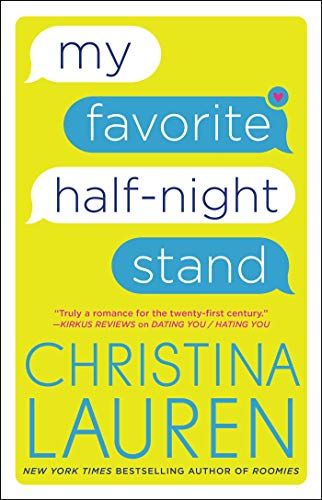
Why Christina Lauren’s MY FAVORITE HALF-NIGHT STAND Is An Ode to Adult Friendships
One of the hardest things about adulthood (other than, of course, trying to adult) is making friends. It’s no surprise that many of our friendships, after you reach a certain age, either peter out or remain the same. Phone calls and texts turn to occasional check-ins during holidays and important life events until the extent of your communication becomes a “like” on social media or a stray comment.
We become so wholly invested in carving out our own lives after college that cultivating friendships falls to the back burner. In fact, this New York Times article examines the ways people become more selective of their circle of friends and interact less with new people the older they become. It’s a sad thought and, given the popularity of staying in and binge-watching Netflix on weekends, not really far-fetched.
But this seeming rarity of “adult friendships” is partly why I love author duo Christina Lauren’s newest book, My Favorite Half-Night Stand. It’s a sweet and adorable romance about two best friends – Millie Morris and Reid Campbell – who hook up and are afraid to take it further and ruin what they have. But if we really get down to it, the true love affair involves their cadre of friends and the tight bond they all share. All over 30 years old, they’ve managed to beat the odds and foster a core support system that are tied together by idiosyncrasies that only they understand, their shared career-mindedness, regular game nights, daily luncheons, and road trips.
Millie, Reid, Stephen, Alex, and Chris all work at the University of California, Santa Barbara and met in various ways and at varying stages of their lives during which such a friendship felt therapeutic. After Millie breaks up with her longtime boyfriend (who had incidentally introduced her to the gang) and joins their loose group of pseudo-friends, they “fell into a rhythm and built a scaffold of community” with “barbecues at Chris’s when it was nice out. Football at Millie’s on Sundays with a big TV and best furniture. Game night at Ed’s. Inside jokes and familiarity.” They have become so tight-knit that at one point, Millie questions whether they are enabling one another to stay on the track of singledom, remain married to their careers, and “to die alone.” Reid, however, responds, “Even if we are enabling each other, who cares? You could never die alone, because you have me.” Cuteness overload aside, Reid’s sentiments stays true throughout the book. *singing Friends theme song here.*
As a matter of fact, the friendship reaches new heights when they all join a hookup site in an effort to get dates for a university event so no one else in the group feels left out. Millie even writes out their dating bios! The chronicles of their dating hijinks make for a truly entertaining read, but their commitment to experiencing the dating scene together is an unprecedented level of camaraderie. Fictional as this book may be, it juxtaposes virtual dating with IRL friendships in a way that indicates which holds greater importance and will remind readers to take stock of their own relationships.
When Millie starts to chat with Reid under a different name, she finds herself both falling for him and trying to figure out a way out of this mess before someone gets hurt. She lets their friendship and the well-being of the group take precedence over her romantic feelings, fully aware of how difficult it is to hold onto it when life pulls you in different directions. With matters with her own family being strained after a tough childhood, she strives to hold onto this family she’s made and chosen herself. After all, who else will humor her fascination with crime and murder if not the Fab Four?
Very rarely do we read about such genuine friendships forming within the scope of adulthood, and My Favorite Half-Night Stand is a celebration of finding friends who may not have been part of your formative years and bound by your shared history, but they like the person you’ve evolved into. My inner hopeless romantic is cheering that Millie and Reid finally find romance in each other, sure, but I’m low-key hoping for the sustainability of their circle of friends.












